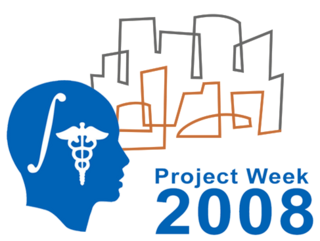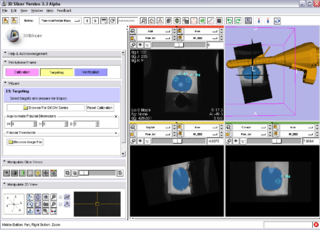Difference between revisions of "2008 Summer Project Week:TransRectal Prostate Biopsy Module"
From NAMIC Wiki
| (4 intermediate revisions by the same user not shown) | |||
| Line 39: | Line 39: | ||
The Transrectal Prostate Biopsy module exists as a | The Transrectal Prostate Biopsy module exists as a | ||
workflow-driven dynamically loaded slicer module. | workflow-driven dynamically loaded slicer module. | ||
| − | + | * Prostate segmentation displayed as a model and as a label image. Will leverage code from glyph display to add prostate outlines in the 2D views. | |
| + | * Fiducial targeting. Computation of the robot pose from the target position still required. | ||
| + | * Engineering model for robot can be displayed, model will be simplified, tied in with OpenIGTLink. | ||
</div> | </div> | ||
Latest revision as of 14:18, 27 June 2008
Home < 2008 Summer Project Week:TransRectal Prostate Biopsy Module Return to Project Week Main Page |
Key Investigators
- PI: Gabor Fichtinger, Queen's University
- Co-I: Purang Abolmaesumi, Queen's University
- Queen's University: David Gobbi, Siddharth Vikal
- Johns Hopkins University: Csaba Csoma
- NA-MIC: Katie Hayes
- GeorgiaTech: Allen Tannenbaum
Objective
Our objective is to add segmented prostate display to the MRI Guided Transrectal Prostate Biopsy Slicer3 Module for our roadmap project.
Approach, Plan
We intend to add the following functionality to the transrectal prostate module.
- Add prostate outline display from segmented prostate modules.
- Utilize Slicer "fiducial" tool for target planning.
- Incorporate an engineering model of the transrectal robot
Progress
The Transrectal Prostate Biopsy module exists as a workflow-driven dynamically loaded slicer module.
- Prostate segmentation displayed as a model and as a label image. Will leverage code from glyph display to add prostate outlines in the 2D views.
- Fiducial targeting. Computation of the robot pose from the target position still required.
- Engineering model for robot can be displayed, model will be simplified, tied in with OpenIGTLink.
